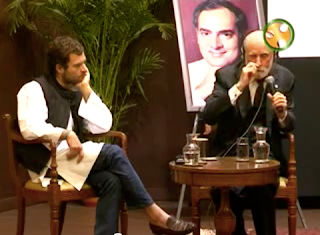Rahul Gandhi in Indian Politics
Watch this video. Starting from 20:15 onwards.
One of the rare occasions where you hear Rahul Gandhi speak. And he speaks sense, not unlike some of his earlier faux pax statements. The statements set me thinking about what kind of vision does he really have for the country. He has not said much directly, but we can make some broad generalisations from the type of policies that his party has supported in last 10 years of rule.
Corruption issues aside, the last 10 years would be known for an unprecedented increase in welfare expenditure and programs, schemes and plans targeted for the poorest of the poor. As my Ravi Shankar remarked he seems to be a believer in the Sen's capability and rights approach to development.
Right to Food, Right to Information, Right to Health, Right to Employment, Right to Education. These are the flagship activities and massive expenditures have been earmarked for them in the 12th five year plan. This government has followed the capability based approach in a manner quite strikingly similar to the 'temples of modern India' approach to development of Nehru.
There are two sides to this. First is the macroeconomic impact of these expenditures. The rising fiscal deficit has been blamed partly on the massive welfare expenditure increase. It is considered to be a very inefficient way of increasing social welfare given that the delivery systems are rife with heavy corruption. Labor has become expensive and the wage rates have gone across all agricultural and non-agricultural activities. For a handy example, wages (men) for ploughing (all india avg) have gone up from 97 rupees in July 2008 to 194 rupees in September 2012. (Source 2008 & 2012). This has invariably pushed up demand. EAPC approach tells us how this contributes to an economy wide inflation. This inflation comes right at the time of a global slowdown, leading to the current stagflation.
The government has come up with Aadhaar and other direct cash transfer schemes to plug the leakages. But these cash transfers will contribute further to the inflationary pressures, as it increases purchasing powers. People will satisfy Maslowian needs first with the cash at hand.
On the positive side, the India's may benefit in the long run from these schemes as improving HDI indicators prove. The economy will benefit in the long run as more healthy, educated, skilled, empowered citizens engage in productive activities. But there is always uncertainty associated with these policies.
Nehru's excessive emphasis on state driven economic progress led us to droughts (as investment in agriculture was ignored) and later laid foundations for import controls and license raj. The opinion is still divided whether his policies (import substitution, state driven industrialization, non-alignment) benefit India or did us more harm than good. His ideas were driven by the concerns of the day and seemed to be the wise then. There were hardly any dissenting economists (except B R Shenoy, Bhagwati and couple others). If you had done a dip stick survey of economists and policy mandarins, few would have predicted the follies of the policies.
Same risk underlie Rahul Gandhi's policies of the day. The payoffs are very uncertain but have current repercussions. Nehru's action were however driven by his own vision and conviction. He was a intellectual heavyweight and renowned worldwide for his statesmanship. Rahul Gandhi is living off on borrowed ideas. He has not articulated any original ideas of his own. Belonging to the foremost political family, he has been surrounded by intellectuals from various walks of life who have possibly enriched his learning.
But rewards from these policies, if and when they materialise, will probably be his. He will no doubt take the credit of implementing them. This might be 10 years or 20 years down the line. Given that he is 40 years old now, he would be politically active for the next couple of decades, well into the middle of this century. A political force which people will have to reckon with, irrespective of the electoral performance of the party. This gives him a good chance to oversee the execution of these programs. If they indeed increase the development levels of India, he would be considered as the true inheritor of the Nehruvian legacy. If they fail, then this would be another great failed vision from the house of Nehru-Gandhis.

Comments
Post a Comment